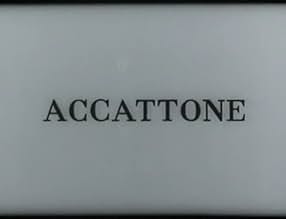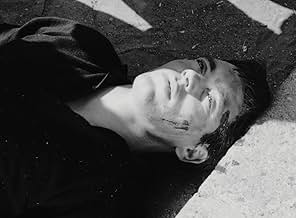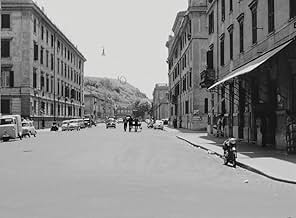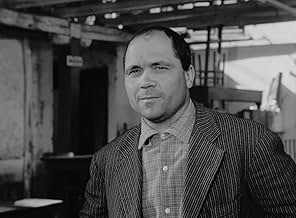CALIFICACIÓN DE IMDb
7.6/10
11 k
TU CALIFICACIÓN
Un proxeneta se encuentra en una encrucijada cuando su prostituta es encarcelada.Un proxeneta se encuentra en una encrucijada cuando su prostituta es encarcelada.Un proxeneta se encuentra en una encrucijada cuando su prostituta es encarcelada.
- Dirección
- Guionistas
- Elenco
- Nominada a1 premio BAFTA
- 3 premios ganados y 4 nominaciones en total
Opiniones destacadas
The term 'accattone' is an old Italian phrase intended to brand a character with an aura of absolute repulsiveness. Thieves and low-lives would usually coin the term when referring to a character that is so despicable, so without moral or social decency, that even the criminals would look down upon them. In Pier Paolo Pasolini's incredibly assured debut, 'Accattone' is Vittorio (Franco Citti), a low-life pimp who when he is not sitting around squeezing money out of people with wagers and tricks, is abusing his lone prostitute who cannot work after breaking her leg in a motorcycle accident. It's a tale of a despicable scumbag, set during a dark period in Rome, where men viewed working as slave labour, and enjoyed themselves by beating prostitutes to within an inch of their life.
It's an incredibly bleak tale, told without sentiment and moral preaching. Pasolini's doesn't seem to want to dictate a larger social message, or make Accattone a sympathetic character who is the victim of political or social oppression, but to simply tell a tale, a real tale, of a group of low-lives who are the way they are because they want to be. After all, the true soul of neo-realism is to portray life the way actual people experience it, not to romanticise or sentimentalise it with the kind of scripts Hollywood are responsible for. Of course, many neo-realist directors would almost betray the genres roots the kind of way only auteurs can manage, and Pasolini would go on to make more surrealistic and interpretive movies, but this is true neo-realism without any kind of magical reward for the audience, or a moment of redemptive enlightenment for its protagonist. It's a story of grit, one that is thrilling and fascinating in equal measures, and with the stamp of a great director.
The film I felt it more akin to is Luis Bunuel's Los Olvidados (1950), a film of equal disregard for cinematic wonder, and one that is also punctured by an impressive dream sequence. Whilst Bunuel's sequence came around the middle section, and was a burst of absolute surrealistic beauty amongst social depravity, Accattone's comes during its climax; a strange, moody set-piece in which Accattone witnesses his own funeral, amongst other things. At first I felt like it was almost betraying what came before, but then I realised it was Pasolini's way to try and get into its characters head, and the outcome is as confusing and as futile as Accattone himself. Though I haven't seen much of Pasolini's work, this is the best I've seen, beating even the distressing brilliance of his final film Salo (1975). Though he would move away from neo-realism, Pasolini achieves more with his debut than some of the greats of the genre would manage to achieve.
www.the-wrath-of-blog.blogspot.com
It's an incredibly bleak tale, told without sentiment and moral preaching. Pasolini's doesn't seem to want to dictate a larger social message, or make Accattone a sympathetic character who is the victim of political or social oppression, but to simply tell a tale, a real tale, of a group of low-lives who are the way they are because they want to be. After all, the true soul of neo-realism is to portray life the way actual people experience it, not to romanticise or sentimentalise it with the kind of scripts Hollywood are responsible for. Of course, many neo-realist directors would almost betray the genres roots the kind of way only auteurs can manage, and Pasolini would go on to make more surrealistic and interpretive movies, but this is true neo-realism without any kind of magical reward for the audience, or a moment of redemptive enlightenment for its protagonist. It's a story of grit, one that is thrilling and fascinating in equal measures, and with the stamp of a great director.
The film I felt it more akin to is Luis Bunuel's Los Olvidados (1950), a film of equal disregard for cinematic wonder, and one that is also punctured by an impressive dream sequence. Whilst Bunuel's sequence came around the middle section, and was a burst of absolute surrealistic beauty amongst social depravity, Accattone's comes during its climax; a strange, moody set-piece in which Accattone witnesses his own funeral, amongst other things. At first I felt like it was almost betraying what came before, but then I realised it was Pasolini's way to try and get into its characters head, and the outcome is as confusing and as futile as Accattone himself. Though I haven't seen much of Pasolini's work, this is the best I've seen, beating even the distressing brilliance of his final film Salo (1975). Though he would move away from neo-realism, Pasolini achieves more with his debut than some of the greats of the genre would manage to achieve.
www.the-wrath-of-blog.blogspot.com
Pasolini's first film "Accatone" is exactly as one would expect a typical Pasolini film to be: wreathed in raw violence, and shot with a brilliant sense of poetic slash brutal realism, reminiscent of the neo-realism era, and perhaps, if not for sure, a semi-autobiographical portrait of life in the streets of Rome's peripheries. "Accatone" is, at its best, a chunk of life, which Pasolini managed to extract not as it initially was, but dramatically filtered through his own personal lyrical gaze. Gangs, prostitutes, lies and deceit lie in this film's core. A sense of irresponsible opportunism is seen in this film, almost no regrets for the past and no fears for the future. In fact, the movie's tragic hero, Vittorio Accatone, is a dark alter-ego of yet another favored Italian movie character, embodied only a year before by Marcello Mastroianni in "La Dolce Vita". Perhaps, in this case, Accatone was not a party animal journalist who sought ephemeral pleasure in social middle-class gatherings and women, but the spirit is, by itself, maintained astonishingly faithfully: Accatone is no longer a protagonist in Pasolini's movie, doomed to descend lower and lower in social class, losing both his dignity, his social acceptability and his profound "style", but a symbol, a metaphor for Pasolini's own political beliefs. Under this figure of a brute, behind the otherwise repelling image of a short dirty man with a sly smile and a peculiar walk, lies the failure of post war Italian government, a government which, according to this movie's subtext, strove so hopelessly to attain social and economical success for Rome's population, and somehow neglected or marginalized Rome's peripheries, causing people like Accatone and his girlfriends to result in prostitution and theft. A kind of pretension and make-belief well being which was also visible, at the time, in America. Yes, Accatone is the result of this American Dream's pastische.
9cogs
Accattone is a relentless study of the suffering that accompanies poverty. Pasolini utilises the well worn techniques of the Italian neo-realist moment to represent the depressing and oppressive life of a pimp - Accattone (played by the astonishing Franco Citti) - in the slums of post-war Rome. His life is beleaguered by guilt and self-disgust; his occupation, which is ostensibly the exploitation of women, causes the titular character untold despair. Ultimately he is unable to rationalise his need to eat with the suffering he causes to the women who work for him; they are, after all, also his lovers. Yet, Pasolini is careful to maintain the humanity of his protagonist by representing his hopeless situation as equally a result of his own doings as that of the social environment. Pasolini's Accattone is a masterful debut which expertly calls into service the devices of the cinema to convey a depressing but also compassionate narrative. His style is equal parts poetry and melodrama; a tough combo for any director. Some moments of this film are as tragically lyrical as those to be found in a film by Robert Bresson or Roberto Rossellini. Accattone is a commendable combination of style and substance which will leave few viewers unaffected.
Yes, it has some not so good scenes, bad lightning and it´s far from Passolini's beautiful aesthetic, but still, this movie is a masterpiece for what it represents. A brilliant start for a genius career, powerful and great story, and Pasolini's essence all over.
Just to start with, Accattone was not filmed in Naples but in Rome. Someone might have brought to that understanding by some Neapolitans gangsters that appear at some point in the movie As for the "ruins" that scatter the landscape, they are mostly buildings that will soon replace the barracks such as the one in which Accattone lives, or the Acquedotto Felice, an ancient Roman aqueduct that runs close to Prenestina and Casilina, two Roman suburbs, that you can see in Mamma Roma as well. Franco Citti, the character of Accattone, perfectly embodies the roman lumpenproletariat of the time: idle, fatalistic and desperate. Pasolini met Franco's brother Sergio, a plasterer, hanging around Cinecittà in 1951. He introduced him to his brother Franco that became Pasolini's dialectical adviser for Accattone, Mamma Roma and his book "Ragazzi di vita"; his "living vocabulary" as he called him. Indeed, Pasolini interests for dialects and slangs (Roman is not really a dialect anymore but a slang) was not disappointed. The dialogues between the characters are full of fantasy: rude and in some way reminiscent of their peasant past. A must see if you're interested in Neorealism and in the "ways of the underworld lumpenproletariat". Someone connected this movie with Bunuel's "Los Olvidados". I definitely agree.
¿Sabías que…?
- TriviaThis was Bernardo Bertolucci's first work in movies. He was an assistant director.
- ErroresThe shadow of the camera is clearly visible on Accattone's shirt when he walks away towards the camera after the fight with Ascenza's Brother.
- Citas
Vittorio "Accattone" Cataldi: Call me Accattone. There are lots of Vittorios but I'm the only Accattone.
- Versiones alternativasThe VHS and DVD versions produced by Water Bearer Films are listed as running 116 minutes, suggesting that this print is four minutes shorter than the original release.
- ConexionesEdited into Red Italy (1979)
- Bandas sonorasSt Matthew Passion
Composed by Johann Sebastian Bach
Selecciones populares
Inicia sesión para calificar y agrega a la lista de videos para obtener recomendaciones personalizadas
- How long is Accattone?Con tecnología de Alexa
Detalles
Taquilla
- Total a nivel mundial
- USD 2,865
- Tiempo de ejecución
- 1h 57min(117 min)
- Color
- Mezcla de sonido
- Relación de aspecto
- 1.37 : 1
Contribuir a esta página
Sugiere una edición o agrega el contenido que falta
































